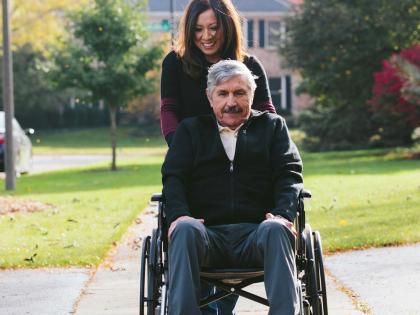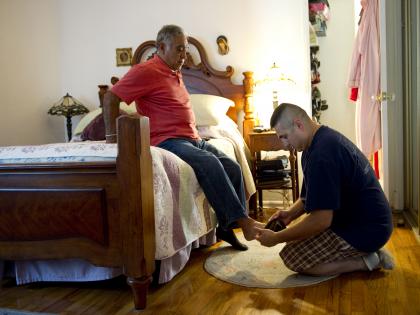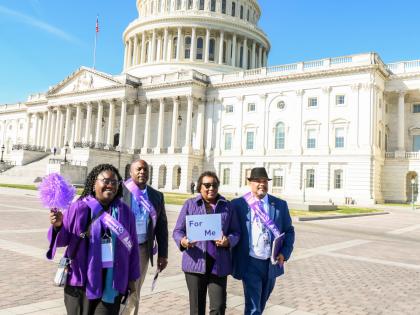New York State Alzheimer’s Plan Overview

The New York State Coordinating Council for Services Related to Alzheimer’s Disease and Other Dementias was established in 2007 by Public Health Law § 2004-a (Chapter 58 of the Laws of 2007, Part B). The Council was formed to facilitate interagency planning and policymaking, review specific agency initiatives for their impact on the care of people living with dementia and their families, and provide a continuing forum for discussions related to creating a comprehensive state policy for Alzheimer’s disease. Charged with providing reports to the governor and the legislature every two years beginning in June 2009, the Council provides policy recommendations for addressing the Alzheimer’s crisis and a review of services to meet the needs of people living with dementia and their families. In December 2009, New York released its first state Alzheimer’s plan, the Annual Report of the New York State Coordinating Council for Services Related to Alzheimer’s Disease and Other Dementias, with updated reports published every two years thereafter. New York released the most recent report in 2019, the 2019 Report of the New York State Coordinating Council for Services Related to Alzheimer’s Disease and Other Dementias.
New York 2026 Policy Priorities

Expand Access to Alzheimer’s Treatments for State-Regulated Insurance Plans
Following the Food and Drug Administration’s (FDA) approval of Alzheimer’s treatments that slow the progression of the disease, state governments have a duty to ensure access to these treatments in Medicaid and other state programs, as well as private insurance plans regulated by the state. After requiring treatment coverage in state employee health plans, the Alzheimer’s Association is calling on state lawmakers to pass legislation requiring coverage in state-regulated private insurance plans to continue the progress toward greater access to treatment.
Educate Direct Care Workers on Dementia
With a growing number of New Yorkers admitted to nursing homes every year, dementia training for direct care workers is critical. To ensure nursing homes can provide quality care to residents living with Alzheimer’s and other dementia, the Alzheimer’s Association is urging state lawmakers to establish dementia-specific training requirements for licensed direct care workers. Through this action, direct care workers will learn more about the unique and complex nature of Alzheimer’s and other dementia, understand effective communication strategies, and be better equipped to provide person-centered care.

Increase Funding for New York’s Alzheimer’s Centers of Excellence
With current promising treatments only effective in the early stages of the disease, getting an early diagnosis is more important than ever. New York State is home to 10 Centers of Excellence for Alzheimer’s Disease (CEADs), recognized by the state and nationally as experts in the diagnosis and care of individuals living with Alzheimer’s and other dementia, and are at the forefront of research and clinical trials seeking effective treatments and cures. The Alzheimer’s Association is urging state lawmakers to increase funding for the centers by $3 million to increase their capacity to detect and diagnose Alzheimer’s.

Increase Funding for the Alzheimer’s Disease Community Assistance Program
Home and community-based services enable people living with dementia to stay in their homes and be active in their communities for as long as possible, as long-term care can be costly at both the public and private levels. The Alzheimer’s Disease Community Assistance Program (AlzCap) is designed to postpone or prevent nursing home placements and provides support services to individuals living with dementia, caregivers, and communities that are disproportionately impacted by dementia. The Alzheimer’s Association is calling on state legislators to support a $1 million increase in funding for AlzCap. This increase would support the program’s ability to achieve its grant initiatives.
New York State Advocacy Day
Join fellow New Yorkers to turn Albany purple for the Alzheimer’s State Advocacy Day! There will be an exciting rally inside the State Capitol featuring dynamic speakers from the New York State Senate and Assembly. Afterward, advocates will jump into a full afternoon of legislative meetings with their state senators and assembly members. There will also be opportunities to visit additional legislative offices, explore the Capitol and connect with fellow advocates throughout the day.
Sign Up to Learn About Advocacy Opportunities in New York

Find My Chapter
Together, we’re making an impact. Find an Alzheimer’s Association chapter in your community for more ways to engage.
Contact Us
State Affairs Contact: Bill Gustafson
Phone: 518.252.0517
Email: bcgustafson@alz.org
426,500
people living with Alzheimer’s in New York
656,000
New Yorkers are providing unpaid care
$6.8 Billion
Medicaid cost of caring for people living with Alzheimer’s (2025)
3,265
deaths from Alzheimer’s in 2022
16%
in hospice with a primary diagnosis of dementia
714
number of geriatricians in New York in 2021
Resources to Drive Change in New York
The following resources developed by AIM and the Alzheimer’s Association will help you learn more about the issues impacting people living with Alzheimer’s and their caregivers, how New York policymakers are addressing these gaps, and how you can help drive change.